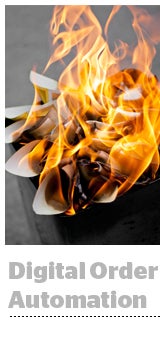 More automation is in the cards for Rubicon Project, which revealed its short-term goals around guaranteed orders at its Automation Summit in Rancho Palos Verdes, Calif., on Thursday.
More automation is in the cards for Rubicon Project, which revealed its short-term goals around guaranteed orders at its Automation Summit in Rancho Palos Verdes, Calif., on Thursday.
The company launched an updated product that powers direct, guaranteed orders.
“Digital advertising is a $62 billion opportunity,” CEO Frank Addante told attendees. “The largest part, premium, has yet to be automated.”
Orders makes up 13% of Rubicon’s business, compared to RTB (75%), while its historical ad network to publisher static business (12%) tapers off.
The new features are designed to let buyers and sellers to transact through Rubicon’s platform instead of through email and signed paper IOs.
This will allow publishers to respond to RFPs and assess inventory availability within the same system.
DigitasLBi, whose clients include American Express, L’Oreal, Lenovo, Sprint and Taco Bell, is a launch partner for the guaranteed orders product, building on a partnership announced in September when the agency plugged into Rubicon’s agency marketplace to access premium programmatic deals.
“The first step with orders is to manage guaranteed programmatic inventory across your portfolio,” said Adam Shlachter, chief investment officer for DigitasLBi. “Over time – and I don’t think we’re there yet – we should be able to show what impression has the most value to the client, and which message for that client, and that will get us closer that the nirvana of one-to-one level of addressability.”
Rubicon’s automated guaranteed product was assembled via its November acquisitions of iSocket and ShinyAds. Those purchases, totaling about $30 million, were big bets on the future of a technology that hasn’t yet gained much traction in the US. iSocket for instance had just $200,000 in revenue.
And Rubicon understands the US companies may still be late adopters. “Direct orders may happen faster for international campaigns,” said Rubicon Marketplace SVP Ryan Polley. In Europe, where IOs are lower, the cost of sale is relatively high, so publishers there will likely lead the charge.
Larger US publishers, however, see opportunity in the long tail of direct deal automation.
“A salesperson would not want to spend time with a smaller, $5,000 to $10,000 buy. But if you do five of those, it’s [$50,000],” said Chris Pirrone, general manager at USA Today Sports Media Group. The company has also created packaging in the seller market discovery tool to “smooth out transacting,” like a March Madness package that allows advertisers to quickly buy against content related to an event and timed to an event.
Along with USA Today Sports, News Corp will be among the publishers leading the charge in direct order automation, with other Rubicon partners weighing or signing contracts for the guaranteed orders product during the event.
In other Rubicon news – or non-news, as it were – the company was opaque about adding mobile and video to its display-based business.
It claims to have solutions –“serving video is not a feat,” Tappin said – but it transacts little because of low supply and low inventory quality. Rubicon does not seem concerned with adoption of its mobile or video products either, or that competitors will gain an irreversible lead.
“We’ve seen the same kind of movie before, where you start with 30 companies and end up with three. There are a lot of smaller companies that don’t survive long term as pure players,” said Greg Raifman, president of Rubicon Project.











